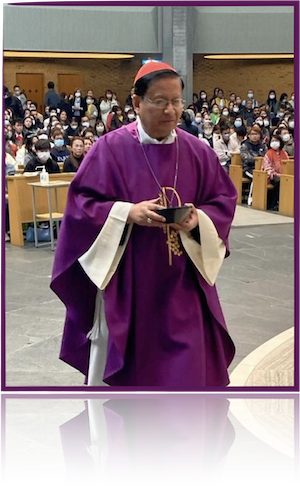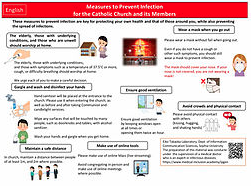
Homily First Sunday Of Lent
Dear Brothers and Sisters in Christ,
Peace of Christ!

It is a great honor to be with you and I am grateful for your warm welcome. I would like to express my gratitude to the Japanese Church, which has been on a synodal journey with the Church and the people of Myanmar, offering their prayers and generous support. I am also thankful for this gathering around the altar taking place in a Jesuit Parish. My appreciation also goes to the Jesuits for their generosity in providing scholarships to the youth of Myanmar to attend the world-famous Sophia University for the past ten years.
My heart is moved by the sight of so many of you. Today we gather in the shadow of conflict, thousands displaced from their homes, seeking solace and guidance amid turmoil. I know hearts deeply troubled by events back in their country. I was with the group called Religions for Peace, a commendable fellowship of humanity seeking reconciliation in all parts of the world wounded by pestering wounds of war and bloodshed. This is a synodal journey for durable peace.
We have entered the Holy Season of Lent with the awareness that for many people of the world, Lent is not a 40-day drama but 365 days of real suffering, tears and brokenness, fear and anxiety, and starvation in an unending way of the Cross. The grinding fear of the Garden of Gethsemane is real for many parents with the moving prayer “Lord, take away this cup of woe from us”. The darkness of despair challenges our finer sensibilities. Lent seems to be embedded in life. Multidimensional crises have thrown many challenges to you - away from home.
Lent teaches us three great lessons: the 40 days. Forty in the Bible also signifies the themes of liberation from oppression, self-purification and hope. In the great discourse of Exodus, we see our story reflected. The suffering Hebrew population under the inhuman yoke of Pharoah cried out to the Lord. In a poignant scene in the Old Testament God tells Moses, from the burning bush: I have heard my people’s cry. Yes. Our God is not a passive God. When the poor cries, the Lord hears and intervenes. The forty years of Exodus of the people, brought them to a promised land of peace and prosperity. Like those Hebrews, we are called upon to think of the suffering people, believe strongly in a God who walks with us in our moments of sorrow. We can never forget the innocent suffering. When we forget the poor and the suffering, God forgets us. The second 40 days we come across is the temptations of Jesus in the desert. Lent is the time of accepting our fragility. Even Jesus was tempted with power, prestige and honor. Sin is self-destruction. Self-purification with the help of the Spirit is the second grace we ask in this season of Lent. The third 40 is very important and that is Hope. In the first Chapter of the Acts of the Apostles, Jesus appears to the Disciples after his resurrection and was with them for forty days. Yes. Christian hope does not end in the grave but in the open graves. Evil has an expiry date; Good will resurrect ultimately, dear brothers. Hope is the destination of the Lent, not the Garden of Gethsemane or Calvary. It is the open graves where God’s Goodness wipes out evil.
Hope is in short supply in the world today. Even in the Holy Land of our Lord’s birth and mission, a churning war breaks the heart of the world. We have had our share of suffering, challenging our faith and future. Yet in this moment of hardship, we find ourselves drawn together, united in our pursuit of peace and reconciliation.
In the Gospel reading, we are reminded of Jesus' journey into the wilderness, a time of trial and temptation. But from this desolate place emerged a message of hope and redemption, as Jesus proclaimed the arrival of God's kingdom and called for repentance. Just as Jesus faced challenges in the wilderness, so too do we confront the trials of conflict and displacement, seeking hope as Jesus found after that long struggle in the desert.
God has brought you to this land of the rising sun, a land of great history and lessons for all of us. The resilient people of Japan rose from the ashes of war to build a nation of hope and prosperity. The history of Japan is a testament to the power of reconciliation. Despite enduring the excruciating devastation of war, the Japanese people embraced a vision of peace and unity, laying the foundation for a brighter future. It is a reminder that even in the darkest of times, there is always hope for renewal and redemption, never compromising on the Biblical mandate of peace with Justice.
Similarly, the people of Myanmar have faced their struggles, grappling with conflict and division. But let us not lose sight of the potential for reconciliation and healing. Just as Japan emerged from the depths of despair, so too can Myanmar find a path towards peace and prosperity.
Today’s readings are like spiritual balm to the wounded soul. The overriding theme of today is reconciliation and God’s unwavering support to suffering people. In Genesis 9:8-15, we encounter the story of God's covenant with Noah after the flood. Despite the devastation that had befallen the earth, God made a promise to make a new creation of peace. The rainbow became a symbol of this covenant, a reminder of God's mercy and steadfast love. The rainbow nation of Myanmar seeks the same God’s intervention in this holy season, to make peace a reality in our nation. Just as God extended his grace to Noah and all humanity, so too does he offer us the gift of reconciliation. In the face of conflict and suffering, we can take solace in knowing that God's love endures forever, guiding us through the darkest of times.
In 1 Peter 3:18-22, we are reminded of the sacrificial love of Christ, who suffered for our sins so that we might be reconciled to God. Through his death and resurrection, Jesus bridged the gap between humanity and divinity, offering us the promise of salvation. Through these readings, let us remember that reconciliation is not merely a one-time event, but a continuous journey towards healing and wholeness. It requires humility, forgiveness, and a willingness to extend grace to those who have wronged us.
Amid our trials and tribulations, may we cling to the promises of God's covenant and the redeeming love of Christ. May we, like the resilient people of Japan, never lose sight of the hope that lies ahead, trusting in God's faithfulness to guide us through the storms of life.
My dear brothers and sisters, today I stand before you with a dream – a dream of hope and reconciliation amid Myanmar's multidimensional crises. Just as Martin Luther King Jr. shared his dream of a world where all people are treated equally, I share with you a vision of a Myanmar where peace and prosperity flourish, where the wounds of conflict are healed, and where all individuals are valued and respected. A dream of a day when the cries of the displaced and the marginalized are heard and their suffering is met with compassion and action. God’s justice prevails everywhere.
I have a dream that the resilient spirit of the Myanmar people will shine through, just as it did for the people of Japan who emerged from the ashes of war to build a nation of hope and prosperity. Despite the challenges we face, I believe in the indomitable human spirit, capable of overcoming even the greatest of obstacles.
I dream of a Myanmar where the lessons of reconciliation from Scripture – from Noah's covenant to Jesus' sacrificial love – are not just words on a page, but guiding principles that shape our interactions with one another. A Myanmar where forgiveness and grace reign supreme, where we extend a hand of friendship to our enemies and work together towards a brighter future.
May God bless the people of Myanmar, and may the dream of peace and reconciliation become a reality in our lifetime. Amen.
by Cardinal Charles Maung Bo., SDB, Archbishop of Yangon, Myanmar
 ENGLISH
ENGLISH  ESPAÑOL
ESPAÑOL 






